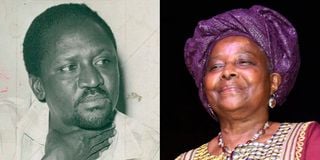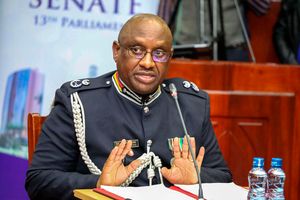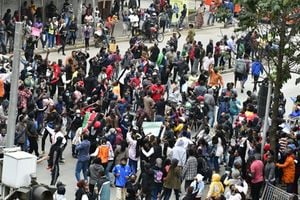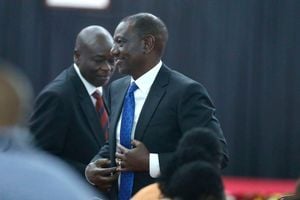When East African literature giants descended on Machakos

Writer-cum-poet Okot P'Bitek (left) and Prof Micere Mugo.
What you need to know:
- We organised what was to be an amazing exposure to the issues around set books, authors and publishing.
- Students from my Machakos Girls and other nearby secondary schools began arriving early for the teach-in.
I was deeply touched and moved by your warm responses to and comments on my narrative of how I transitioned from a refugee to the current “Kenyaphiliac” elder with homes from Kisumu to Kilifi.
Machakos, as you noted, played, and still plays, a central role in the saga. So, you can imagine my delight at being reminded, by Richard Arden, of a unique adventure we had out there in late 1977.
Richard Arden is a very long-time friend of mine, whom I keep teasing as a man with the name of a forest. He was teaching at the Machakos Boys High School when I got to Machakos Girls.
It was a pleasant surprise finding him there, as we had been postgraduate students together at Makerere in the early 1970s. I was doing my MA and he was doing his Postgraduate Diploma in Education under the TEA (Teachers for East Africa) Programme.
The “TEA” was a British technical assistance project where young graduates from British universities came and took their Education Diplomas at Makerere.
They then taught at high schools in East Africa for some years. It was a practical measure of remedying the shortage of local graduate teachers in our countries.
Many of those young Brits served with distinction, and some of us may remember being taught by them.
A significant side effect of the TEA programme, however, was that some of those young British men and women, being exposed to East Africa in their very impressionable years, fell irredeemably in love with the land.
After all, they studied with us, sharing our residential halls at Makerere and teachers’ quarters at the schools where they taught.
Richard Arden, my Machakos colleague, was one of those deeply bitten by the “TEA” bug. He first came to my notice when we were celebrating Makerere’s Diamond Jubilee in 1972.
An ardent lover of theatre, he portrayed Professor Coarx, the hypocritical and randy expatriate, in the world premiere of the late John Ruganda’s play, Black Mamba, which we presented as part of the celebrations.
After a brief teaching stint at Gayaza High School, Uganda’s oldest and most prestigious girls’ school, he relocated to Kenya, and the rest, as they say, is history.
After Machakos Boys, there was Kagumo Teachers College, co-authorship with Kenyan colleagues of the Integrated English Course and work with the British Council in Nairobi (and a pair of teaching booklets with me).
Apart from a few sallies Richard has made out on studies and some consultancies, he has remained grounded in Kenya.
Regarding the event of which Richard reminded me, it was the “Machakos Literary Teach-In Sponsored by Musau Hides and Skins”, as the banner welcoming participants to a unique event at Machakos Boys High School had it.
We had realised the importance of making our students aware of the rich East African literary tradition that was steadily taking over the former ‘O’ and ‘A’ Level type of the Literature in English curriculum.
Ever the resourceful innovator, Richard Arden, who was a teacher of English at Machakos Boys, had decided to organise a mini-festival to expose his Kenya Advanced Certificate of Education students to the rich array of East African literary giants then residing in Kenya, and also the world of publishing.
Together we organised what was to be an amazing exposure to the issues around set books, authors and publishing. Even more encouraging was to get a local Machakos business to sponsor the costs of the whole event.
Students from my Machakos Girls and other nearby secondary schools began arriving early for the teach-in. We spent the morning with a panel of writers and publishers challenging each other on the opportunities and obstacles for authors.
Amongst the glittering array of well-known authors and publishers present that morning in Ukambani were Ngugi wa Thiong’o, John Ruganda, Micere Mugo, Okot p.Bitek and David Rubadiri.
My name was being murmured on the fringes of the meet, but I was glad to be just a teacher to my girls. The publishers included Jonathan Kariara, then of OUP, and Henry Chakava, then of Heinemann. Students were thrilled to be able to ask questions of their literary heroes and see them in action, raising issues and arguing over the rights and wrongs of copyright and royalties.
The second part of the day was particularly thrilling for the boys and girls. Each of the well-known authors agreed to discuss with the students the set literature texts for the then-KACE examinations : A Grain of Wheat, God’s Bits of Wood by Sembene Ousmane, A Wreath for Udomo by Peter Abrahams, The Plague by Albert Camus.
Ngugi refused to talk about his own book, concentrating instead on Ousmane’s novel translated from the French.
The exciting finale came with Okot p’Bitek enacting a tour de force on how to present and teach Oral Literature. He was in his element and he danced, he sang, he spouted poetry.
He was on fire. The students had never seen such literary energy in their lives! In many ways, it was the climax of the day.
Then the Travelling Theatre arrived, to put on a performance of another set text , Betrayal in the City by Francis Imbuga, another fantastic opportunity for the students to really understand the key issues in the play, and appreciate the talents of the university actors. Kivutha Kibwana and Nazi, his eventual partner, were among the student actors from UoN.
We did not talk about “competency-based curricula” in those days. But our Machakos teach-in was a step in that direction.
Incidentally, after the teach-in, many of the giants, including David Rubadiri, John Ruganda and Okot p’Bitek, assembled at my rambling bungalow at the Machakos Girls School, and we talked through most of the night.
Richard Arden now lives in Kenya, and I am sure he would love to hear of any plans for such similar events to be held in schools across the country.
I would also love to hear from Musau Hides and Skins.
Prof Bukenya is a leading East African scholar of English and literature. [email protected]





